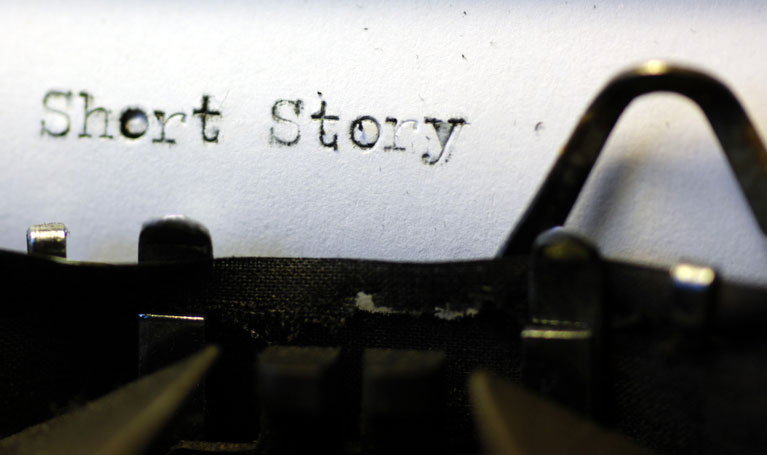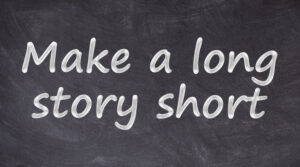Written by Scott Wilson

Short stories may be the ultimate art form for creative writers. Working in a form that tops out around 10,000 words, a good short story writer is a good writer, period. The kind of artistry, craft, and skill that are needed to develop a meaningful storyline, work in all the plot points, build characters that readers care about, and wrap everything up in a satisfying and coherent ending is the truest demonstration of creative writing mastery.
I do feel that if you can write one good sentence and then another good sentence and then another, you end up with a good story.
~ Amy Hempel
Short stories are a natural place to start as a writer. It’s a form that can express your ideas and stories while keeping a manageable size and page count that won’t take years to finish. Many writers will continue to craft short stories throughout their career.
But relatively few creative writers specialize in the form. The limitations can be exacting, and the canvas tiny. Like building a ship in a bottle, or making a charcoal sketch, every step is critical and impacts the final piece.
While it’s an easy format in which to get started, it’s incredibly difficult to master the short story without the right education and mentoring.
Short stories include some of the most revered fiction in all genres. From Poe’s The Tell-Tale Heart to Franz Kafka’s The Metamorphosis to Flannery O’Connor’s A Good Man is Hard to Find, short stories are widely read and long remembered.
I find it satisfying and intellectually stimulating to work with the intensity, brevity, balance and word play of the short story.
~ Annie Proulx
Ms. Proulx should know… her Western short story Brokeback Mountain was a sensation in the literary world that led to an Academy Award-winning film adaptation. And it’s a sentiment shared by many writers. If you want to earn respect in the writing community, getting a reputation for excellence in short form works is a sure way to get it.
If you are interested in becoming a master of the short story form, then a creative writing degree should be your first stop.
What Is a Short Story?
 Classically, a short story was defined as a piece of writing that could be read in one sitting. They are the natural literate descendants of a long tradition of oral storytelling, where listeners could reasonably expect to be enthralled by a campfire tale that was concluded before the fire burned down.
Classically, a short story was defined as a piece of writing that could be read in one sitting. They are the natural literate descendants of a long tradition of oral storytelling, where listeners could reasonably expect to be enthralled by a campfire tale that was concluded before the fire burned down.
As a definition for the writer, though, that leaves much to be desired. What’s a sitting? How fast is the average reader? Must a short story have a formal plot, as Somerset Maugham believed, or are they rather allowed to be simple slices of life without definitive form, as Anton Chekhov argued?
Short Stories Are Only One Way of Dicing up Fiction Genres by Word Count
 Bringing up any kind of genre categorization system in a creative writing classroom is a good way to start a spirited discussion with participants taking every possible position. Defining genre by length, as is necessary in the short story realm, is no exception.
Bringing up any kind of genre categorization system in a creative writing classroom is a good way to start a spirited discussion with participants taking every possible position. Defining genre by length, as is necessary in the short story realm, is no exception.
Almost everyone will agree that a short story comes in under 10,000 words, but many subscribe to 7,500 at the top end. Novellas, the next traditional category up the ladder, clock in from 20,000 to 50,000 or so, although many people will say it’s a short novel if it goes over 40,000. And some folks now feel that a category dubbed the novelette belongs between novellas and short stories, defined from 7,500 to 19,500 or so.
You can go the other direction, too. The category of flash fiction takes place in the sub-1,000 word range, with micro-flash going under 500 for those who dare.
And if such stunts are in your blood, you can also explore drabble fiction, at around 100 words, or 55fiction, which must come in at 55 words exactly. It’s an open question at some point if you’re still writing short stories or have verged into poetry… but in either case, creative writing studies will help you hit your marks.
That very range of ideas and definitions shows how liberating writing short stories can be, however. With no settled definition, no fixed genre, and no firm requirements, a short story can be whatever you want it to be.
Developing a Writing Career Around Short Stories
Short stories flourished during the 19th Century as literacy grew and printing presses became widespread. It was a form that lent itself to easy publication, and a voracious audience gobbled up the work of authors famous and obscure. Literary giants like Twain, Poe, Tolstoy, Kipling, and O. Henry enjoyed widespread recognition and success from their short works.
The short story market is a far more difficult place to break in and make a living as a writer than it once was. While many readers are indeed focusing on short pieces of writing, the traditional venues for publishing those stories have shrunken dramatically.
Short story specialists have some advantages in the publishing world, however. Although the market is no longer what it once was, by their nature there are more opportunities to have a short story published each year than there are openings for publishing a full book.
On top of that, an extensive portfolio of short stories to your name offers a full demonstration of your skills and capabilities as a writer. With a broader catalog to showcase, rather than one or a few longer manuscripts, you can break in to different kinds of creative writing more easily.
Using an Online Creative Writing Degree Program to Hone Your Short Story Skills
 In one sense, all creative writers are short story writers. Every story starts out small. Even the greatest novels begin only as the inkling of an outline in the mind of an author. And the setting of a scene, the conclusion of a chapter, the telling of a tale within any larger work embodies pieces of the art of writing short stories.
In one sense, all creative writers are short story writers. Every story starts out small. Even the greatest novels begin only as the inkling of an outline in the mind of an author. And the setting of a scene, the conclusion of a chapter, the telling of a tale within any larger work embodies pieces of the art of writing short stories.
Creative writing programs also reinforce this reality. Even the longest degree programs aren’t long enough to begin and complete a novel-length work. Even if that could happen, it would leave little room to explore, learn, and grow.
So most assignments take the form of essays and short stories. By working in these most basic building blocks of the writer’s craft, students get most of the kind of skills they will need to apply working on longer novels.
When the Goon Squad Comes Calling, Short Stories May Become Novels
 Stringing together a series of short stories into something that is a much longer work isn’t a new idea… Chaucer’s The Canterbury Tales offer one classic example, as does One Thousand and One Nights, an even older work.
Stringing together a series of short stories into something that is a much longer work isn’t a new idea… Chaucer’s The Canterbury Tales offer one classic example, as does One Thousand and One Nights, an even older work.
But few modern novels have used the format to such great effect as Jennifer Egan’s Pulitzer Prize-Winning A Visit from the Goon Squad.
The thirteen chapters in A Visit are each distinct stories, without a central character or overarching narrative. But they are also linked together by more than just the framing device, confusing both reviewers and even Egan herself, who wasn’t sure whether to characterize the book as a novel or a short-story collection.
But it impressed both the National Book Critics Circle and the Pulitzer committee enough to win their awards for fiction.
As a meditation on time and culture, the book works whether you see it as a novel or a collection of stories. As a groundbreaking approach to creative writing through the medium of the short story, it showcases Egan’s talent and the possibility for all short story authors.
So the very format of a creative writing degree is built around the short story genre. But that’s not the only way that a formal degree can boost your short story writing talents.
Your Reading Experience Will Shape Your Short Story Writing
You should write because you love the shape of stories and sentences and the creation of different words on a page. Writing comes from reading, and reading is the finest teacher of how to write.
~ Annie Proulx
On top of spending your time writing short story assignments, you’ll also end up reading a lot of short story material from other authors. For the same reason that short stories are functionally a good fit for evaluating your writing progression, they are also one of the best ways to deliver a lot of different reading experiences and introduce a diversity of literary techniques and concepts.
You’ll get those both through reading popular works by masters of literature and through reading work by your classmates as they write their own short stories for class. Just as important, you’ll analyze and discuss what you have read, led by instructors who can help you understand why and how short stories work.
Developing the Discipline and Habits of a Great Short Story Writer Through Study
It takes enormous discipline to get a short story polished and publication-worthy. Writing, editing, and revising all require hard work. It’s a level of commitment that many writers have trouble sustaining on their own.
Writing is hard, but the more you write, and enjoy what you write, the better it gets.
~ Alice Munro
Alice Munro wrote short stories almost exclusively, and famously published revisions and variations of the same stories throughout her career
But a degree program both offers you the incentives you need to write and finish your stories, and tools and techniques you can use to keep writing and completing your work over the long course of your career. You’ll learn how to keep your productivity up even in the face of doubt or flagging motivation. And you’ll develop the habits of hard work and revision that you need to make it as a successful short story writer.
Getting the Practice and Feedback You Need to Hone Excellent Short Stories
 Support in creative writing degrees can take many forms. Sometimes, what you need to hear isn’t what you want to hear. Friends and family won’t give you that kind of feedback, but everyone in a creative writing program knows how to rip the band-aid off and give you the kind of input that will help you grow as a short-story writer.
Support in creative writing degrees can take many forms. Sometimes, what you need to hear isn’t what you want to hear. Friends and family won’t give you that kind of feedback, but everyone in a creative writing program knows how to rip the band-aid off and give you the kind of input that will help you grow as a short-story writer.
Through the support of fellow students and your instructors, you’ll get the satisfaction of turning out work you are proud of. You’ll learn how to both give and receive feedback, to deconstruct stories through the eyes of others as well as incorporating your own perspectives.
Meeting the People Who Will Help You Get Your Short Stories Published
Another advantage that comes from formal studies in creative writing is the shared purpose and goals you have with your professors and classmates. Instructors, guest lecturers, and writing workshop participants are commonly published authors themselves, with experience and contacts in the industry. And your classmates are probably mostly bound for publication as well, with careers that will lead them into various positions in the publishing industry or contacts with leading agencies and editors.
These are all important people to know as you are attempting to get your own career off the ground. The slush piles at the publications you will be submitting short stories to are massive. It can be tough to even get your stories read. So having contacts who can put in a good word for you or flag your submission for review are a valuable thing to cultivate in creative writing programs.
Online Creative Writing Degrees Offer Flexibility While Polishing Writing Skills
 All the advantages you will find as a short story writer taking a creative writing program will be found just as easily, and often more conveniently, in online formats.
All the advantages you will find as a short story writer taking a creative writing program will be found just as easily, and often more conveniently, in online formats.
Online education has become more popular in almost every field in recent years, but it offers a uniquely good fit for writing studies. Whether you are on campus or off, much of your time in a creative writing degree will be spent in isolation. You’ll be doing a ton of reading and of writing, each of which requires solitude and is often most productive when you can pick the best times and places in which to do them.
With an online program, that’s no problem. Other than perhaps one in-person meeting a semester or a year, you can complete all your work on your own time and in your own spaces. Submitting work through online systems and engaging with fellow students and professors through chat and internet forums leans in to the kind of interaction you are all there for in the first place: the written word.
Short or Long Creative Writing Studies Are Available to Launch Your Short Story Career
 People come to short story writing at every stage of life and career. You may be coming out of high school with a strong urge to blow your creativity wide open and become the next great American short story writer. You may already be a writer but working in a different genre or type of writing and want to make a transition to more short form creative writing. Or maybe you’re a professional in a different field entirely, but always wanted a way to get the great story ideas you have out of your head and into writing.
People come to short story writing at every stage of life and career. You may be coming out of high school with a strong urge to blow your creativity wide open and become the next great American short story writer. You may already be a writer but working in a different genre or type of writing and want to make a transition to more short form creative writing. Or maybe you’re a professional in a different field entirely, but always wanted a way to get the great story ideas you have out of your head and into writing.
There’s a formal kind of creative writing education available online or traditionally for all those people and more. Understanding what the options look like will help you pick the right one for your goals.
Certificate Degrees in Creative Writing
A certificate offers a short, focused course of instruction that may only take a few weeks or a few months. Typically they have only a handful of classes and very few electives. But they make up for it by frequently being specialized themselves, so you are only studying exactly the aspects of writing that you are most interested in. This can be a specific genre, technique, or skillset.
Associate Degrees in Creative Writing
A two-year program that offers introductory material essential to all kinds of writing careers, from grammar to vocabulary. About half the curriculum will also involve general education classes like social studies and science, serving as part of the knowledge and professional training that come with a traditional liberal arts degree.
Bachelor’s Degrees in Creative Writing
At the four-year level, you’ll find even more in-depth instruction in aspects of creative short story writing like plotting, character development, and tone. These degrees continue the general knowledge and critical thinking education from the associate’s level in greater depth as well, making them a preferred entry-level credential for many kinds of writing jobs.

Master’s Degrees in Creative Writing
Taking another two to three years, the master’s in English, or Master of Fine Arts (MFA) in creative writing represents the pinnacle of studies in the craft of writing. Setting aside the general studies of lower-level programs, these degrees focus exclusively on the art of honing character, plot, and dialogue in a variety of genres. Graduates come out of these programs with an extensive portfolio of short form writing showcasing their abilities.
Doctoral Degrees in Creative Writing
At the doctoral level, creative writing degrees are primarily intended to prepare students for academic careers teaching others how to write. Students learn how to deconstruct writing even further, analyzing and understanding the basis of excellent short stories.
All these options put a good choice in front of you for developing your short story skills no matter where you are coming from or what your career intentions are. With the right support, the right learning environments, and the right resources, you can get the training you need to write short stories in any genre that interests you.



